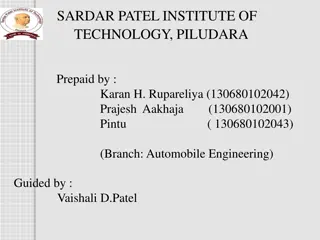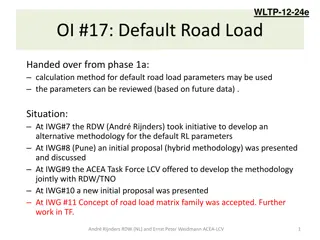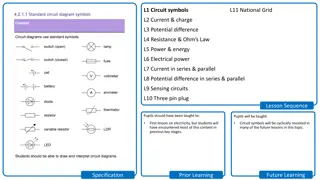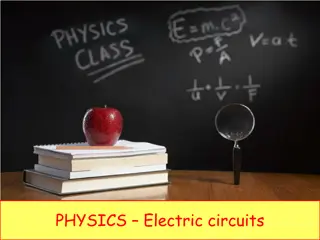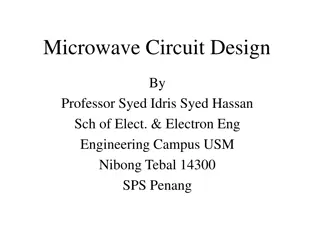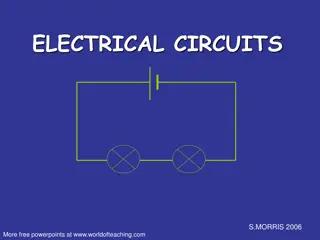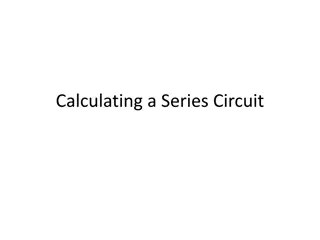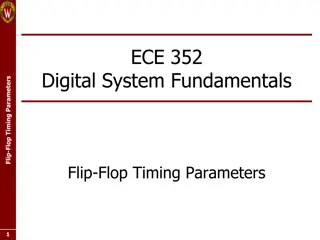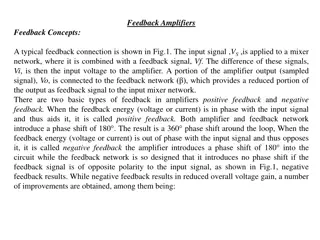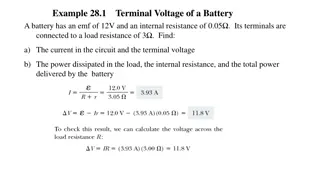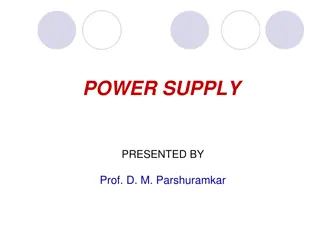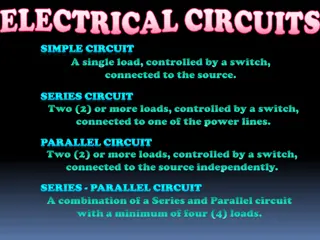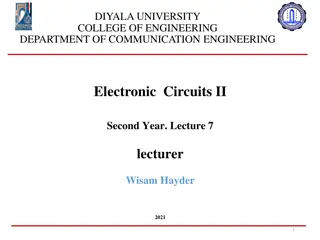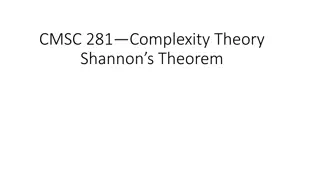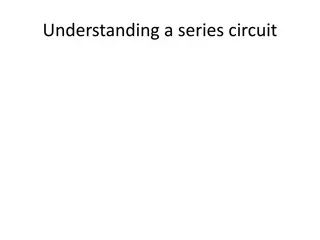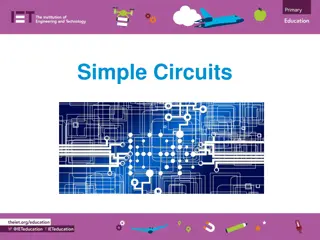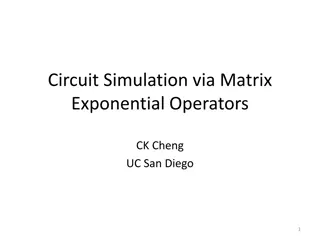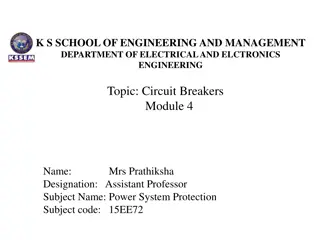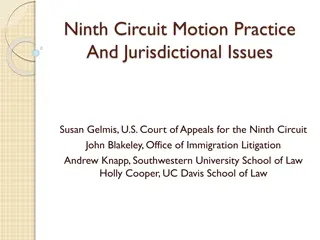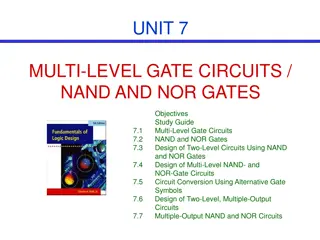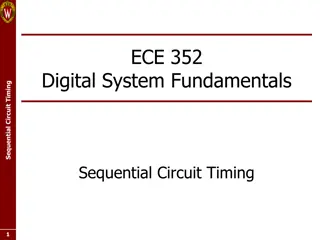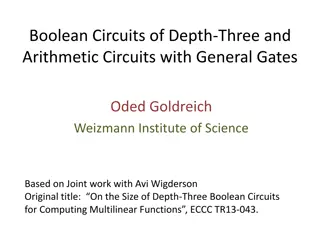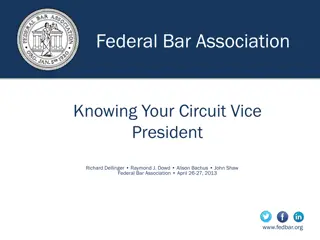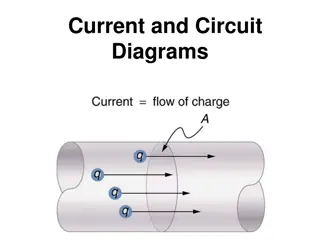Designing a 5V DC Power Supply Using IC 7805: Step-by-Step Guide
Design a 5V DC power supply using IC 7805 by selecting a regulator IC, transformer, diodes for the bridge, smoothing capacitor, and ensuring safety. The circuit includes an input transformer, rectifier circuit, filter, and regulator. Understand the importance of each component in the design process
6 views • 20 slides
Power System Fault Calculation and Protection Analysis
In this technical document, we delve into the calculation of fault current and fault apparent power in symmetrical three-phase short circuit scenarios within power systems. Through detailed equivalent circuit diagrams, reactance calculations, and per unit value derivations, the fault current and app
5 views • 15 slides
Adventurous 8-Day Spiti Circuit Biking Journey
Embark on an exhilarating Spiti circuit biking trip from Delhi! Join WanderOn's Spiti Valley Biking Expedition for 2024 and immerse yourself in the ultimate riding experience through stunning landscapes. To learn more , visit https:\/\/wanderon.in\/trip\/spiti-circuit-biking
4 views • 1 slides
Circuit Training Methods: A Comprehensive Guide
Circuit training is a versatile workout method that combines various exercises to target strength, endurance, and overall fitness. Developed in 1953, it offers a time-efficient way to enhance multiple fitness components simultaneously. This article explores popular circuit training methods, advantag
2 views • 24 slides
Inside the Circuitry of the Casio CTK-450 Electronic Keyboard
Detailed insights into the internal components of the Casio CTK-450 electronic keyboard, covering the power supply, CPU functionality, keyboard matrix circuit, filter block, and mute circuit. Explore how each element contributes to the overall functioning of the keyboard, from processing key presses
0 views • 11 slides
Understanding Miniature Circuit Breakers (MCB) in Automobile Engineering
Learn about Miniature Circuit Breakers (MCB) used in Automobile Engineering, including their principle of operation, construction, and application. MCBs serve as efficient replacements for traditional fuses, providing overload and short circuit protection through thermal and magnetic mechanisms. The
0 views • 15 slides
Exploring the Impact of Salt Quantity on Saltwater Circuit Current
A saltwater circuit utilizes saltwater as a key element for conducting electricity. This unique circuit involves the dissolution of salt into sodium and chloride ions, which, when exposed to an electric voltage, allows for the flow of electricity. The quantity of salt present in the circuit directly
0 views • 9 slides
- Development of Alternative Methodology for Default Road Load Parameters in Vehicle Testing
- The initiative to develop an alternative methodology for default road load parameters in vehicle testing was led by RDW and ACEA. The process involved multiple meetings, discussions, and proposals, resulting in the acceptance of the concept of a road load matrix family. Various x-factors were adop
2 views • 22 slides
Understanding Electricity: Circuit Symbols and Components
Explore the fundamentals of electricity with a focus on circuit symbols, components, series, and parallel circuits. Delve into the difference between complete and incomplete circuits, and discover the importance of using circuit diagrams to depict electrical setups accurately.
0 views • 18 slides
Comprehensive Guide to Electric Circuits and Circuit Diagram Interpretation
Explore the fundamentals of electric circuits, circuit components, and diagram interpretation. Learn about series and parallel circuits, resistors, sources, switches, transducers, and more. Discover how to calculate resistance, current, and potential difference in circuits. Gain insights into diodes
2 views • 76 slides
Comprehensive Microwave Circuit Design Course Overview
This comprehensive course on Microwave Circuit Design by Professor Syed Idris Syed Hassan covers topics such as transmission lines, network parameters, matching techniques, power dividers, diode circuits, amplifiers, oscillators, filters design, and more. The syllabus includes lectures, simulations,
0 views • 49 slides
Understanding Electrical Circuits: Basics and Types
The presentation covers the basics of electrical circuits, explaining the concept of electric current, the role of cells and batteries, simple circuit components like switches and lamps, and circuit diagrams. It further delves into types of circuits - series circuits and parallel circuits, detailing
0 views • 24 slides
Understanding Series Circuit Calculations for Voltage, Current, and Power
Exploring the calculations in a series circuit to determine voltage, current, power, and total resistance. Learn the formulas and steps to find these values, emphasizing the relationship between resistance, current, and voltage drops in the circuit.
0 views • 12 slides
Understanding Hammett Parameters in Organic Chemistry
The Hammett Parameters analysis, particularly the Hammett Plot, is a valuable tool in studying the electronic effects of substituents on aromatic systems. This linear free-energy relationship approach aids in optimizing reaction conditions and probing reaction mechanisms. Applications of Hammett Par
0 views • 8 slides
Preparing for Oral Argument in the Eleventh Circuit: Essential Tips
Understand the process of oral arguments in the Eleventh Circuit, including when to request oral argument, FRAP 34 guidelines, and how to handle the notice of oral argument. Get insights on making the most of oral argument opportunities and potentially shaping circuit law.
0 views • 32 slides
IEEE 802.11-20/0586r4 MLO Indication of Critical Updates
The document discusses the need for a mechanism in the MLO framework to enable non-AP MLDs to receive updates to operational parameters without monitoring all links. It proposes that each AP of an MLD should provide an indication of updates to another AP's operational parameters. It also outlines ho
0 views • 17 slides
Understanding Flip-Flop Timing Parameters in Digital Systems
In digital systems, flip-flop timing parameters are crucial for proper operation. Synchronous inputs must remain stable before and after the clock edge to ensure correct storage of values. Clock frequency, setup time, hold time, and propagation delay play key roles in signal integrity. By considerin
0 views • 9 slides
Understanding Feedback Amplifiers in Electronic Circuits
Feedback amplifiers play a crucial role in electronic circuits by providing mechanisms for controlling gain, stability, and overall performance. There are two basic types of feedback - positive and negative, each offering distinct advantages. The four ways of connecting feedback signals involve volt
1 views • 18 slides
Electrical Circuit Analysis Examples and Solutions
Explore various examples of electrical circuit analysis involving batteries, resistors, and parallel connections. Learn how to calculate current, voltage, power dissipation, and equivalent resistance in different circuit configurations. Detailed solutions provided for better understanding.
0 views • 12 slides
Understanding Power Supplies and Rectifiers in Electrical Systems
Power supplies play a crucial role in converting AC power to DC power, with two main types being unregulated and regulated. Regulated power supplies consist of essential components like a step-down transformer, full-wave rectifier, filter circuit, and voltage-regulating circuit. Rectifiers are devic
0 views • 25 slides
Understanding Electrical Circuits: Basics and Wiring Diagrams
Explore different types of electrical circuits including simple circuit, series circuit, parallel circuit, and combination circuits. Learn about loads, switches, and connections to power sources. Dive into wiring diagrams for practical applications and visual understanding.
0 views • 8 slides
Transistor Tuned Amplifiers: Operation and Analysis
Transistor tuned amplifiers consist of a parallel tuned circuit as the collector load, amplifying a specific frequency while rejecting others. The resonant frequency of the tuned circuit is crucial for amplification. A high Q circuit offers maximum voltage gain at the resonant frequency but decrease
0 views • 30 slides
Modeling Water Leak into Sodium in BN-600 Steam Generator
This paper discusses the modeling of a water leak into sodium in the BN-600 steam generator during a specific incident in 1982. It compares calculated data with leak detection system indications and analyzes hydrodynamic parameters in the second sodium circuit. The study utilized SLEAK and LLEAK-3C.
10 views • 9 slides
Understanding Electronic Components in Circuits
An electrical circuit converts energy while an electronic circuit processes information. Electronic components like buzzer, diode, LED, and LDR play essential roles in circuit operations. Learn about the functions and symbols of these components, including forward and reverse bias in diodes.
1 views • 14 slides
Building Engineering Systems Overview
Explore the standards, requirements, and parameters for building engineering systems, focusing on indoor microclimate conditions, energy efficiency, and optimal parameters for different seasons. Learn about European and Lithuanian standards, as well as specific parameters for school classrooms. Refe
0 views • 8 slides
Exploring Circuit Size Bounds in Complexity Theory
The article delves into Shannon's Theorem in Complexity Theory, discussing the upper bounds of circuit sizes for Boolean functions of n variables. It explores the 1-1 correspondence with 0-1 strings of length 2n and how Boolean functions can be expressed as CNF or DNF formulas. The computation of th
2 views • 19 slides
Understanding a Series Circuit: Exploring Potential Difference, Current, and Resistance
Dive into the concept of a series circuit by visualizing it as a circular road with cars representing electrical charge flow. Learn about potential difference, current, energy transfer, and resistance in the circuit through relatable analogies and illustrations. Understand how a break in the loop or
0 views • 48 slides
Precision Labs Op Amps Circuit Analysis
Explore a detailed analysis of a circuit utilizing Precision Labs Op Amps, developed by Art Kay and Ian Williams. Calculate total output voltage considering offset voltage and bias current, analyze typical and maximum values for OPA211 and OPA188, and simulate results for different configurations. G
0 views • 7 slides
Creating a Simple Circuit with Motor, Battery, and Switch
This guide illustrates how to assemble a simple electrical circuit using a motor, battery pack, switch, wires, and a homemade paper clip switch. Learn the steps involved in preparing and joining wires, making a switch from a paper clip, and assembling the components to complete the circuit. Follow a
0 views • 7 slides
Understanding Biomarkers and Maturity Parameters in Petroleum Exploration
Biomarkers and maturity parameters play crucial roles in characterizing source materials and assessing the thermal maturity of organic matter in petroleum exploration. Specific biomarkers and non-biomarker maturity parameters are utilized to determine the relative maturity of source rocks and oils.
0 views • 17 slides
Advanced Circuit Simulation Using Matrix Exponential Operators
Explore the innovative approach of circuit simulation via matrix exponential operators as proposed by CK Cheng from UC San Diego. The method involves utilizing general matrix exponentials, Krylov spaces, Arnoldi orthonormalization, and inverting Krylov subspaces for accurate simulations. These techn
0 views • 28 slides
Comprehensive Overview of Circuit Breakers in Power System Protection
Circuit breakers play a critical role in protecting electrical circuits from damage caused by excess current. This informative module covers topics like fault clearing time, arc voltage, arc interruption methods, and types of circuit breakers. Through detailed explanations and images, readers can un
0 views • 20 slides
Ninth Circuit Motion Practice and Jurisdictional Issues Summary
This text provides valuable information on Ninth Circuit motion practice and jurisdictional issues, focusing on topics such as petitions for review, tips for petitioning for review, motion for stay of removal, and related legal standards and procedures. It emphasizes the importance of timely filing,
0 views • 31 slides
Design of Multi-Level Gate Circuits Using NAND and NOR Gates
Explore the design and analysis of multi-level gate circuits using NAND and NOR gates, including two-level and multiple-output circuit design. Learn about circuit conversion, alternative gate symbols, AND-OR, OR-AND configurations, and factorization of multi-level gate circuits. Dive into examples a
0 views • 28 slides
Understanding Parameters, Statistics, and Statistical Estimation in Statistics
In statistics, we differentiate between parameters and statistics, where parameters describe populations and statistics describe samples. Statistical estimation involves drawing conclusions about populations based on sample data. The Law of Large Numbers explains the relationship between sample stat
0 views • 12 slides
Understanding Sequential Circuit Timing and Clock Frequency
Sequential circuit timing is crucial for designing digital systems. The minimum clock period, slack values, clock frequency, and critical paths play key roles in determining the operational speed and performance of sequential circuits. By analyzing flip-flop timing parameters, combinatorial logic de
0 views • 20 slides
Depth-Three Boolean Circuits and Arithmetic Circuits: A Study on Circuit Complexity
Explore the intricacies of depth-three Boolean circuits and arithmetic circuits with general gates, focusing on the size, structure, and complexity measures. The research delves into the relationship between circuit depth, gate types, and multi-linear functions, offering insights into circuit models
0 views • 12 slides
Federal Bar Association Circuit Vice Presidents: Roles and Responsibilities
Circuit Vice Presidents play a vital role within the Federal Bar Association, serving as a crucial link between national leadership and chapter leaders. Elected for 2-year terms and responsible for staying in contact with chapters within their circuits, Circuit Vice Presidents have duties that inclu
0 views • 20 slides
Precision Linear Analog Circuit Analysis
Explore the detailed analysis of a precision linear analog circuit, featuring dual feedback configurations, beta values, control loop derivations, and loop gain calculations. The content covers key components, such as operational amplifiers and resistors, and explains how to derive closed-loop gain,
0 views • 18 slides
Understanding Current and Circuit Diagrams
Current is the flow of electrical charge, measured in amperes. It flows from positively charged to negatively charged sources, while electrons flow in the opposite direction. Conductors allow charge to flow easily, while insulators do not. Circuit diagrams show how a circuit works, with a battery as
0 views • 16 slides





